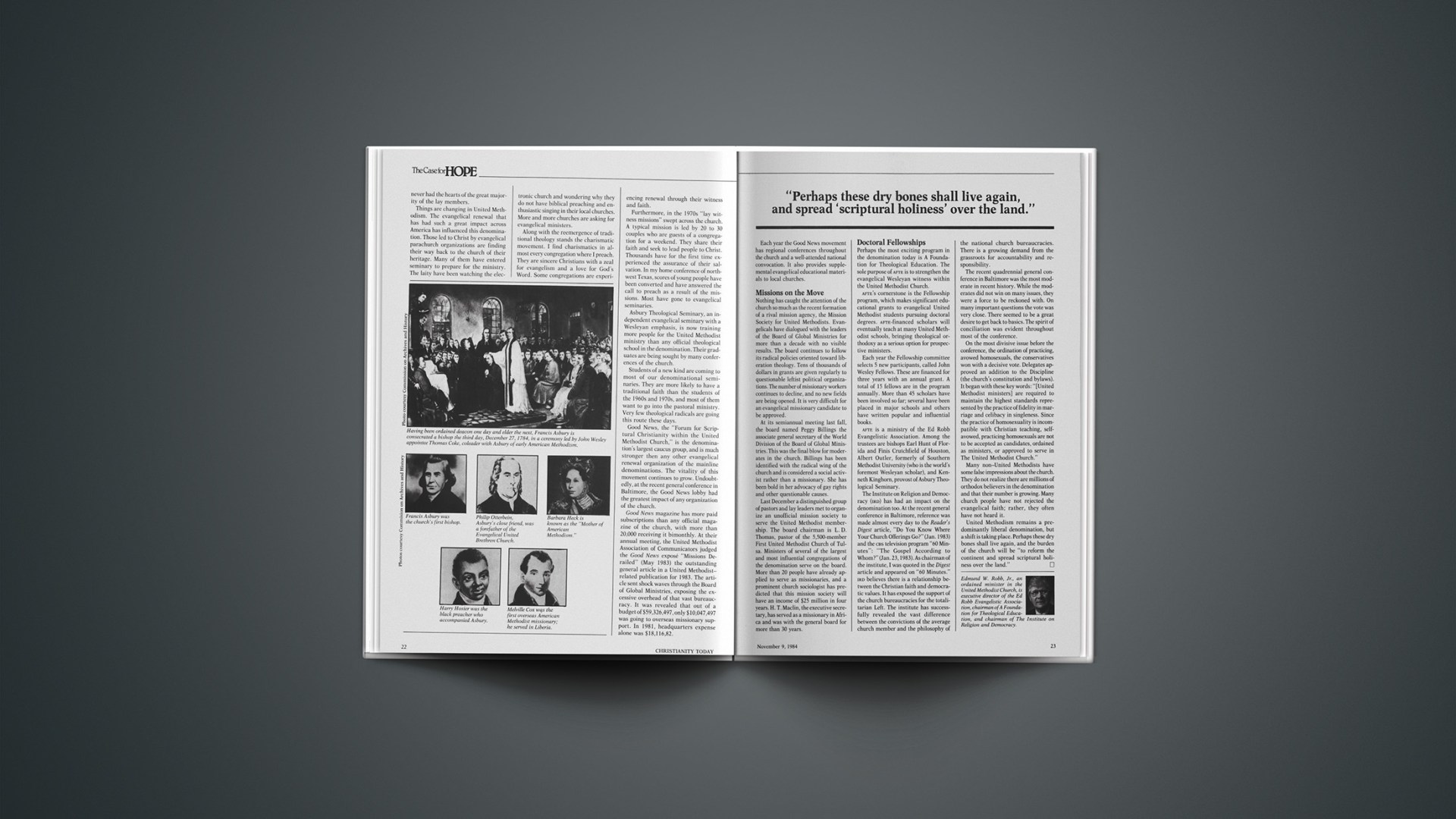Missions On The Move
Nothing has caught the attention of the church so much as the recent formation of a rival mission agency, the Mission Society for United Methodists. Evangelicals have dialogued with the leaders of the Board of Global Ministries for more than a decade with no visible results. The board continues to follow its radical policies oriented toward liberation theology. Tens of thousands of dollars in grants are given regularly to questionable leftist political organizations. The number of missionary workers continues to decline, and no new fields are being opened. It is very difficult for an evangelical missionary candidate to be approved.
At its semiannual meeting last fall, the board named Peggy Billings the associate general secretary of the World Division of the Board of Global Ministries. This was the final blow for moderates in the church. Billings has been identified with the radical wing of the church and is considered a social activist rather than a missionary. She has been bold in her advocacy of gay rights and other questionable causes.
Last December a distinguished group of pastors and lay leaders met to organize an unofficial mission society to serve the United Methodist membership. The board chairman is L. D. Thomas, pastor of the 5,500-member First United Methodist Church of Tulsa. Ministers of several of the largest and most influential congregations of the denomination serve on the board. More than 20 people have already applied to serve as missionaries, and a prominent church sociologist has predicted that this mission society will have an income of $25 million in four years. H. T. Maclin, the executive secretary, has served as a missionary in Africa and was with the general board for more than 30 years.
Doctoral Fellowships
Perhaps the most exciting program in the denomination today is A Foundation for Theological Education. The sole purpose of AFTE is to strengthen the evangelical Wesleyan witness within the United Methodist Church.
AFTE’s cornerstone is the Fellowship program, which makes significant educational grants to evangelical United Methodist students pursuing doctoral degrees. AFTE-financed scholars will eventually teach at many United Methodist schools, bringing theological orthodoxy as a serious option for prospective ministers.
Each year the Fellowship committee selects 5 new participants, called John Wesley Fellows. These are financed for three years with an annual grant. A total of 15 fellows are in the program annually. More than 45 scholars have been involved so far; several have been placed in major schools and others have written popular and influential books.
AFTE is a ministry of the Ed Robb Evangelistic Association. Among the trustees are bishops Earl Hunt of Florida and Finis Crutchfield of Houston, Albert Outler, formerly of Southern Methodist University (who is the world’s foremost Wesleyan scholar), and Kenneth Kinghorn, provost of Asbury Theological Seminary.
The Institute on Religion and Democracy (IRD) has had an impact on the denomination too. At the recent general conference in Baltimore, reference was made almost every day to the Reader’s Digest article, “Do You Know Where Your Church Offerings Go?” (Jan. 1983) and the CBS television program “60 Minutes”: “The Gospel According to Whom?” (Jan. 23, 1983). As chairman of the institute, I was quoted in the Digest article and appeared on “60 Minutes.” IRD believes there is a relationship between the Christian faith and democratic values. It has exposed the support of the church bureaucracies for the totalitarian Left. The institute has successfully revealed the vast difference between the convictions of the average church member and the philosophy of the national church bureaucracies. There is a growing demand from the grassroots for accountability and responsibility.
The recent quadrennial general conference in Baltimore was the most moderate in recent history. While the moderates did not win on many issues, they were a force to be reckoned with. On many important questions the vote was very close. There seemed to be a great desire to get back to basics. The spirit of conciliation was evident throughout most of the conference.
On the most divisive issue before the conference, the ordination of practicing, avowed homosexuals, the conservatives won with a decisive vote. Delegates approved an addition to the Discipline (the church’s constitution and bylaws). It began with these key words: “[United Methodist ministers] are required to maintain the highest standards represented by the practice of fidelity in marriage and celibacy in singleness. Since the practice of homosexuality is incompatible with Christian teaching, self-avowed, practicing homosexuals are not to be accepted as candidates, ordained as ministers, or approved to serve in The United Methodist Church.”
Many non-United Methodists have some false impressions about the church. They do not realize there are millions of orthodox believers in the denomination and that their number is growing. Many church people have not rejected the evangelical faith; rather, they often have not heard it.
United Methodism remains a predominantly liberal denomination, but a shift is taking place. Perhaps these dry bones shall live again, and the burden of the church will be “to reform the continent and spread scriptural holiness over the land.”










